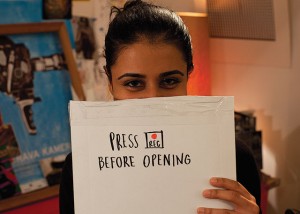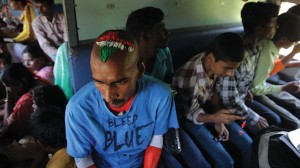2014 South Asian Film Festival
Enzian event expands to three days
For its 20th year, the festival will screen five features and one short
From The Orlando Weekly, October 7, 2014
For its 20th year, the South Asian Film Festival is expanding from two to three days and from four to five features. To be held at the Enzian Theater in Maitland on October 11-13, the event, which showcases Indian and Pakistani culture through films both from and about those nations, will screen films at 11 a.m. and 1:30 p.m. on Saturday and Sunday, with an additional film at 6:30 p.m. on Monday.
“This year’s lineup was selected from about 50 films,” says Programming Director Matthew Curtis. “The five features – three narrative and two documentary – and one short include four Southeast premieres and a number of award winners from … formidable South Asian film festivals, [and] for our 20th anniversary, we … have brought back the closing-night screening on Monday, with the filmmaker in attendance.”
Food and drink specials, served during screenings but not at Eden Bar, are tentatively scheduled to include vegetable samosas, chicken tikka with coconut rice, tempura vegetables, mango lassi and Kingfisher beer. Individual tickets are $10, with a series pass costing $45. For more information on the festival, which is co-presented by the Asian Cultural Association, visit http://enzian.org/festivals/south_asian.
Hank and Asha, 2013, 1 ¾ stars
The festival begins with a sweet, minimalist, hyper-realistic tale of two lonely 20-somethings, one American and one Indian, who strike up an online-video friendship after she sees a documentary of his at a film festival in Prague. She’s living there temporarily, while he, an aspiring filmmaker working as a PA on a TV show, has just moved to New York City.
 After this odd, uniquely modern relationship blossoms, Hank proposes the next logical step: meeting in person. What he doesn’t know, however, is that a peculiarly Indian tradition may doom their chance for a deeper connection.
After this odd, uniquely modern relationship blossoms, Hank proposes the next logical step: meeting in person. What he doesn’t know, however, is that a peculiarly Indian tradition may doom their chance for a deeper connection.
Hank and Asha (Saturday, 11 a.m.), told entirely in brief films that the two make for each other, is, regrettably, one part mesmerizing to two parts tedious. And though the two characters and the actors (Andrew Pastides and Mahira Kakkar) who play them are instantly likeable, this first project by writer-director James Duff seems stretched to the breaking point to reach its 73-minute runtime and is, therefore, better suited to a short.
The film is preceded by Blouse (2 stars), a 20-minute Hindi-language romantic comedy that fits well with the feature but is not much more than a slightly amusing trifle.
Beyond All Boundaries, 2013, 3 ¾ stars
In India, the biggest sport is cricket and the biggest sporting event is the Cricket World Cup. Yet despite the nation’s devotion to its pastime and the fact that India produces 70 percent of worldwide cricket revenue, the Indian team entered the 2011 contest having not won the Cup in 28 years. It was against that backdrop of crushing expectation that director Sushrut Jain filmed Beyond All Boundaries (Saturday, 1:30 p.m.), a look at not just the 2011 tournament, which India hosted, but an intimate examination of the passion that two young amateur cricketers and one obsessively devoted, poverty-stricken fan share for their game.
 “In a country divided by language, religion, region, caste and class, cricket is the one unifying force,” a slightly heavy-handed but nevertheless effective narration tells us. “For us, Indians, cricket is not a sport – cricket is a religion.”
“In a country divided by language, religion, region, caste and class, cricket is the one unifying force,” a slightly heavy-handed but nevertheless effective narration tells us. “For us, Indians, cricket is not a sport – cricket is a religion.”
It’s not the intent of this English-Hindi award-winning documentary to teach the rules of cricket. Instead, it tenderly offers up a lesson in the rules of life, by way of a glimpses at three ordinary people who have given up almost everything for a chance to embrace the game they love. It’s the one must-see of the festival.
Siddharth, 2013, 3 ¼ stars
The tragedies of Indian child labor and abduction are the subjects of director and co-writer Richie Mehta’s Hindi-language drama about a father’s heartbreaking search for his missing 12-year-old boy. Having been sent to work in factory for a month because his family needed the money, Siddharth never returns, so his father, a poor street worker, sets out across the country to find him.
“There are so many missing children this year,” he’s told during his exhausting quest. “It’s a big business. It feeds the organ trade, sex trade, child labor.”
Siddharth (Sunday, 11 a.m.) is slow to build, and Rajesh Tailang’s muted performance as the father is a bit ineffective at first, particularly because he’s called upon to do almost all the heavy lifting, as the mother (Tannishtha Chatterjee) is relegated to a minor role similar to the positon most real Indian women play. But this is one film that’s worth sticking around for, as the bitterly realistic and courageous ending suits the story splendidly.
The Auction House: A Tale of Two Brothers, 2014, 3 stars
The family-owned Russell Exchange is Calcutta’s oldest remaining auction house, but its prestige and profitability is diminishing. Arshad has been running the business for decades while his elder brother Anwer has been living in England. But after 42 years, Anwer has returned in triumphant fashion – or so he’d like to believe – to restore the house’s faded glory.
“My brother was in England, and he was well settled there,” Arshad says with a certain sadness. “I have done this because I had to do it, but this business will not last for very, very long.”
Though Anwer tends to ham it up, and the camera creates a slight reality-TV feel, The Auction House (Sunday, 1:30 p.m.) is nevertheless an enlightening glimpse into both the changing and the constant elements of Indian culture. But perhaps even more significantly, director Edward Owles’s film is an intimate portrait of two very different siblings who must respect tradition while also adapting to a new world and struggling with their own complex familial relationship.
Brahmin Bulls, 2013, 1 ¾ stars
In the festival’s final film, Sid (Sendhil Ramamurthy) is a struggling architect separated from his wife and searching for direction. That search is made both more meaningful and complicated by the unexpected arrival of his widowed father, Ashok (Roshan Seth), who is in town seemingly to attend an academic conference but is really hoping to reconnect with an old, secret flame (Mary Steenburgen). The fact that the visit will allow father and son to bond seems inconsequential to them at first but ends up altering both their lives.
“You’re still angry with me because I encouraged you to be the best,” Ashok tells his son, who retorts, “I’m still angry because it was always about you, … what you wanted.”
Though the two characters are Indian, Brahmin Bulls (Monday, 6:30 p.m., followed by a director Q&A) is a fundamentally American story, set in America with American generational issues. It has little to do with Asian culture, and though it is a nice change of pace from the other offerings, it feels out of place. And despite some tenderness, director Mahesh Pailoor’s debut is doomed to amateurism by contrived conflicts, its characters’ unlikability and a stiff, forced performance by Seth.
© 2014 Orlando Weekly / MeierMovies, LLC